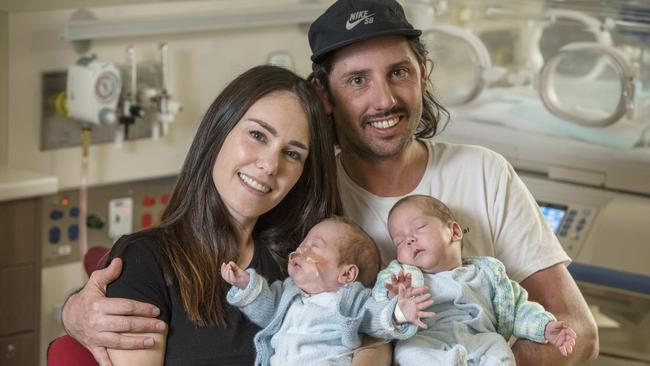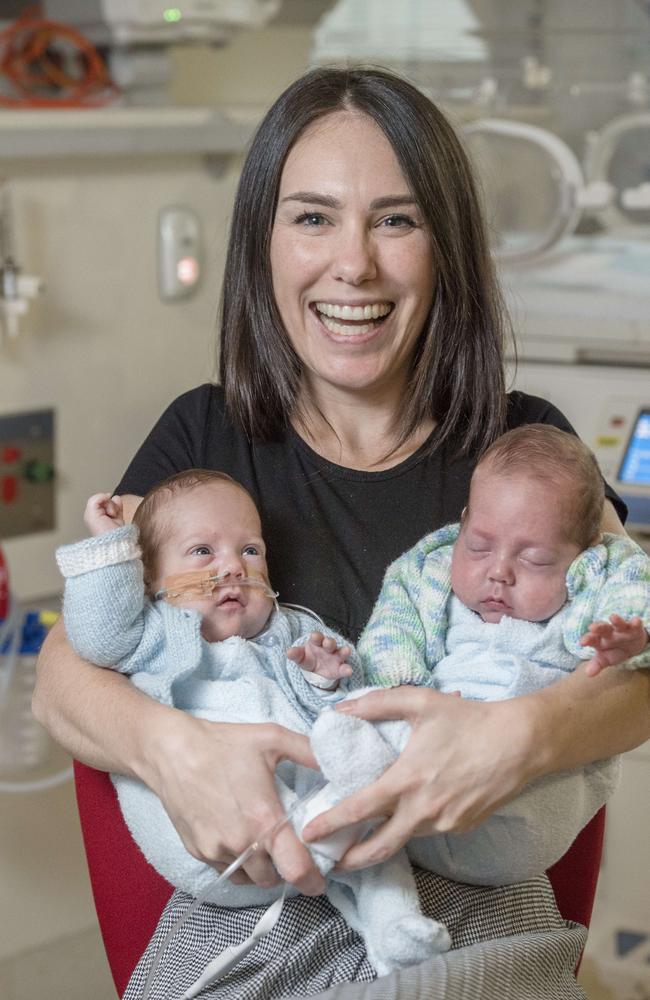Royal Women’s Hospital pioneering treatment may give fragile babies lifesaving fresh breath of air
AN experimental treatment being pioneered in Melbourne could be a lifesaving breath of fresh air for the most fragile babies around the world.

VIC News
Don't miss out on the headlines from VIC News. Followed categories will be added to My News.
AN experimental treatment being pioneered in Melbourne could be a lifesaving breath of fresh air for the most fragile babies around the world.
A dose of inflammation-fighting steroids directly into the lungs of extremely premature babies in their first few hours of life is hoped to not only keep them alive, but prevent brain development problems and breathing difficulties later in life.
RELATED:
RWH STUDY: PREGNANT WOMEN INADEQUATE NUTRITION RISK
SEEK HELP EARLY FOR DEPRESSION DURING PREGNANCY, MOTHER URGES
ANTENATAL ANXIETY CHANGES PLACENTA GENE EXPRESSION, RWH RESEARCH FINDS

The Royal Women’s Hospital treatment has already proved successful in a small trial, but is now being rolled out in one of the largest neonatal trials, involving 1060 of the tiniest babies born across Australia, New Zealand and Canada.
RWH neonatologist Dr Brett Manley said the treatment could offer hope to the families of babies born before 28 weeks, who presently face the horrific odds that half either die or develop chronic lung disease, known as bronchopulmonary dysplasia.
“There are currently very few therapies or treatments in our profession that reduce the risk of BPD, so we are a bit stuck with this problem,” he said.
The breathing machines needed to keep extremely premature babies alive over their first weeks and months can also cause inflammation in their lungs and chronic lung disease by 36 weeks.
In previous decades, steroids were given to tiny babies to break down the inflammation in their lungs.
“However, the intravenous drugs spreading through the bloodstream did more harm than good in many babies, so the treatment is now only used in the most desperate circumstances.
But rather than administering steroids in the usual way, the Royal Women’s, in partnership with the Murdoch Children’s Research Institute, has come up with a way of administering the steroid Budesonide directly into the lungs.

By combining the steroid with a surfactant — a naturally occurring compound in the lungs — doctors can bypass the bloodstream.
“The surfactant is an amazing thing,” Dr Manley said. “You literally squirt it into the upper airways and it is rapidly absorbed and incorporated throughout the whole lung.
“The theory is that giving it into the lungs means it will have its maximal anti-inflammatory in the lungs and have very little effect in the bloodstream with its side effects.”
When her twins Sid and Otto were born at just 25 weeks on January 17, Zoe Starr became all too aware of the danger of BPD.
The Geelong mum’s twins have been enrolled in the PLUSS trial, which she hopes will not only benefit them, but others to come.
“Otto was ventilated for the first five weeks of his life and since then has slowly worked his way through all the breathing apparatus ... and there is a chance we may even take him home on oxygen,” she said.
“We wanted to be involved in the study so hopefully they and future babies will benefit from this new treatment that potentially helps babies’ lung development and prevents chronic lung disease.”
To donate to the RWH’s Miracle Mums Appeal go to: thewomens.org.au/donate
MORE HERALD SUN NEWS:
SAM POWELL-PEPPER LATEST: SEVEN’S FURY WITH KOCHIE
CITY OF MELBOURNE LORD MAYOR BY-ELECTION CANDIDATE SURVEY
MELBOURNE YOUTH CRIME: MATTHEW GUY’S GANG-BUSTING PLEDGE


